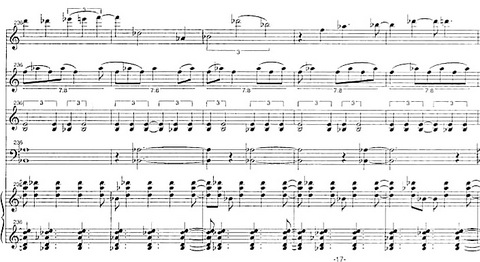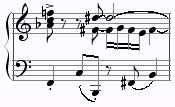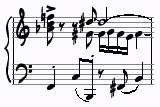Tonight at 8 I’m delivering the keynote address at the Ives Vocal Marathon at Wesleyan University, the Memorial Chapel.Â
Starting Over
We’ve been watching Ken Burns’s jazz documentary again, for the third or fourth time at least (I can’t watch the last tape, in which Wynton Marsalis skips over 15 years of exciting post-bebop jazz to pronounce himself the reincarnation of true jazz, as if Ornette Coleman and Cecil Taylor and Arthur Rhames never existed), and my favorite quote came up, from Roy Eldridge. It’s a statement that, to me, seems to sum up the essential condition of music:
The beboppers are good. But they closed more clubs than they opened.
Outside My Comfort Zones
Somehow through the end of last semester, a few measures every weekend, I also managed to finish my piece for pianist Sarah Cahill’s “A Sweeter Music” project, a series of anti-war pieces that she’ll be premiering through the year, which has been getting a lot of attention at New Music Box. The composers, besides me, are Meredith Monk, Frederic Rzewski, Terry Riley, Yoko Ono, Bernice Johnson Reagon, Pauline Oliveros, Peter Garland, Paul Dresher, Carl Stone, Ingram Marshall, Jerome Kitzke, Phil Kline, Mamoru Fujieda, Larry Polansky, Michael Byron, The Residents, and Preben Antonsen. Terry told Sarah he wouldn’t write an anti-war piece, but he’d write a pro-peace piece. In response, I told her I’d be happy to write a piece titled “Dick Cheney Is A Lying Asshole.”Â
But I didn’t. Instead, it’s called War Is Just a Racket. Brian McLaren, to whom I am deeply grateful for it, sent me a wonderful text by General Smedley Butler. Butler (pictured) was a popular general who, in 1933, was approached by a bunch of plutocrats (including apparently Prescott Bush, the outgoing pResident’s grandfather) who wanted to stage a quiet coup, reducing FDR to a figurehead and setting up a government friendlier to Hitler and Mussolini. It was an attempt at a fascist takeover, and they thought with Butler on their side, the army would play along. Butler feigned interest for awhile, but after he’d gotten enough information, he marched straight to Congress and turned the bastards in. No one seems sure exactly what happened, but apparently FDR agreed not to jail them all if they’d stand out of the way of the New Deal – and that’s what it took to get the New Deal through the first time (of which we now need another one).Â
Anyway, that’s the background, with plenty of relevance to what’s been going on in recent years. The text itself is just a 1933 speech Butler gave in retirement detailing his disillusionment with the purposes for which the U.S. Government uses its armed forces. I believe in political music, but I’ve come to think that it’s really only effective with text, and Sarah wanted a solo piece. So I rather borrowed the device that Christian Wolff used in his 1971 Accompaniments for Frederic Rzewski, whereby the pianist speaks the text at a normal pace, and chords associated with certain syllables are played along with the words, in a speech-determined rhythm. (My Custer piece was also indebted to Accompaniments, which seems to remain a pretty well-known work, even though Christian later disavowed its Maoist politics and it’s never come out on CD.) Writing this for a pianist took me way out of my comfort zone, because playing the piano and speaking are two things I’ve never been able to do at the same time – when I try to do it in class, I get all tongue-tied and clumsy. (One uses the right brain and one the left, and I have a theory about how my brain hemispheres are more disconnected than average.) But Sarah says she can do it, and I tried to make it graceful. She premieres it March 12 in New York. It strikes me as peculiar that this is the second time I’ve set to music words by a general.
Anyway, here’s the Smedley Butler text, and thanks, Brian. And Sarah.
War is just a racket. A racket is best described, I believe, as something that is not what it seems to the majority of people. Only a small inside group knows what it is about. It is conducted for the benefit of the very few at the expense of the masses. I believe in adequate defense at the coastline and nothing else. If a nation comes over here to fight, then we’ll fight. The trouble with America is that when the dollar only earns 6 percent over here, then it gets restless and goes overseas to get 100 percent. Then the flag follows the dollar and the soldiers follow the flag. I wouldn’t go to war again as I have done to protect some lousy investment of the bankers. There are only two things we should fight for. One is the defense of our homes and the other is the Bill of Rights. War for any other reason is simply a racket.
There isn’t a trick in the racketeering bag that the military gang is blind to. It has its “finger men” to point out enemies, its “muscle men” to destroy enemies, its “brain men” to plan war preparations, and a “Big Boss” Super-Nationalistic-Capitalism. It may seem odd for me, a military man to adopt such a comparison. Truthfulness compels me to. I spent thirty-three years and four months in active military service as a member of this country’s most agile military force, the Marine Corps. I served in all commissioned ranks from Second Lieutenant to Major-General. And during that period, I spent most of my time being a high class muscle-man for Big Business, for Wall Street and for the Bankers. In short, I was a racketeer, a gangster for capitalism.
I suspected I was just part of a racket at the time. Now I am sure of it. Like all the members of the military profession, I never had a thought of my own until I left the service. My mental faculties remained in suspended animation while I obeyed the orders of higher-ups. This is typical with everyone in the military service. I helped make Mexico, especially Tampico, safe for American oil interests in 1914. I helped make Haiti and Cuba a decent place for the National City Bank boys to collect revenues in. I helped in the raping of half a dozen Central American republics for the benefits of Wall Street. The record of racketeering is long. I helped purify Nicaragua for the international banking house of Brown Brothers in 1909-1912. I brought light to the Dominican Republic for American sugar interests in 1916. In China I helped to see to it that Standard Oil went its way unmolested.
During those years, I had, as the boys in the back room would say, a swell racket. Looking back on it, I feel that I could have given Al Capone a few hints. The best he could do was to operate his racket in three districts. I operated on three continents.
By the way, I notice I’m getting advertisers over on the right lately. Be sure to click on ’em, and thank you.
Theories of Minimalism Still Welcome
This might be a timely moment to reiterate that the deadline for submissions to the second international conference on minimalist music, which is being held at the University of Missouri at Kansas City September 2-6, is January 31. We’re prepared for more papers than we’ve received so far, so if you’re interested, give us a try. We’ve gotten almost no papers from Europe yet, but it was our European colleagues who asked to have the date extended, so maybe their proposals will all arrive at the last minute. We’re honoring Charlemagne Palestine, Tom Johnson, and Mikel Rouse, and the barbecue’s going to be to die for. E-mail your proposals to me (kgann@earthlink.net) and David McIntire (compositeurkc@sbcglobal.net). The economy’s making the money hard to come by, but as I told David: “We’re minimalists – if we can’t hold a conference in this economy, nobody can.”
Freedom Caught in Notation
I wrote my “American Composer” column for Chamber Music magazine this month – though it won’t be out till March – on John Halle, one of the eight composers of the Common Sense collective. And, as often happens, I obtained a generous influx of his music, so I uploaded seven pieces to PostClassic Radio. John’s vocal music employs political texts – from Project for the New American Century, Larry Summers, D.C. activist Sam Smith – that sound pretty shocking when set to music with seeming innocence. (Much the way, I suppose, that Allan Kozinn once wrote that Custer’s hate-spewing memoires sound in my Custer and Sitting Bull.) My real interest, though, is in John’s rhythms, a typical example given here from his 1997 piece Spooks (the instruments are flute, oboe, violin, cello, and two guitars):Â
The Armchair Musicologist
I sent in the quadruply-revised final draft of my book on 4’33” today: 217 pages, with 325 footnotes and eight pages of bibliography. Wiley Hitchcock would be proud of my footnotes-to-pages ratio. He used to kid me about how many footnotes in my American music book read “e-mail to the author.” But hey, I figure, if you know the composer, why spend hours rooting through a library when you can send an e-mail?
Theorizing NOW
My Analysis of Minimalism seminar I just finished was the most exciting course I’ve ever taught, and I plan to write about it at greater length. But as I’m sitting here grading final papers, I’m pleased as punch to note that one student, Erica Ball (herself a precociously interesting composer) wrote her analysis paper on two works written late in 2008, by young composers Caroline Mallonée and Jim Altieri. When I think how many young composers come out of grad school these days all excited about dinosaurs like Ligeti, Xenakis, and Carter, I am especially proud. In my ideal pedagogical situation, all music more than five years old, or written by composers more than a generation older than the students, would be considered old classics, to be consulted like Bach or Beethoven as a way of grounding one’s standards, while the bulk of analysis and study would be devoted to music of RIGHT NOW. Other analyses were written on the opening section of Michael Gordon’s Trance, Jim Tenney’s Diapason, John Luther Adams’s Dream in White on White and In the White Silence, Eve Beglarian’s The Bus Driver Didn’t Change His Mind, John Adams’s China Gates (for a perspective from the distant past), and Corigliano’s Fantasia on an Ostinato (Corigliano called it his “minimalist piece,” so I said what the heck). I’ve been frustrated with minimalism classes before, but this time managed to bring together a bunch of serious music majors who really got the music, who looked past Glass and Reich and Pärt to the hipper developments that followed, and concocted theories about postminimalism’s relation to modernism. They were wowed by Nick Didkovsky’s rock-jazz-classical fusion, charmed by Daniel Lentz, blown away by Belinda Reynolds. This music may have a future after all.
Trivia Question for New Year’s Eve
What character figured in the lives of both John Cage and James Bond? (I’ll refrain from posting any answers until there are several right ones, as there are bound to be.)
Ben Harper shot back the answer within seconds. Other answers showed considerable originality, and I got a big laugh out of the idea of Cage’s book M being about Bond’s boss.
Happy New Year. If you need to insult a composer at a party tonight, here’s an old classic:Â
“Your music will be played after Mozart’s and Beethoven’s is forgotten. And not before.”
Last three words sotto voce as needed.
PBStupidity
Public radio station WAMC from Albany runs pretty continuously in our house, and I support it and get a lot from it. But the stupidity of their music stories lately is about to drive me to random acts of violence. On Thanksgiving they did a vapid, all-morning “analysis” of the complete Beatles’ White Album with a bunch of variously educated talking heads, of which the only comment I remember was the insightful, “Ooooooh, the maracas!” And this week they’ve been promising a “mathematical” analysis of the striking opening chord to “It’s Been a Hard Day’s Night.” Well, you put “mathematics” and “chord” together, and I get interested. It turns out some sound expert did a Fourier analysis to find out that what sounded like just an unusual guitar chord was actually doubled on piano. The same genius then spent a full minute of air time (was this national?) speculating that it might be possible to find patterns in a Fourier analysis of the sound waves that could reveal which parts of the songs were written by Lennon, and which by McCartney. No hint of what you’d look for, to discern personality in sound waves – it just might be possible. Meanwhile, the station’s truculent guru Alan Chartock, whose obstreperousness I treasure, veers away from covering classical music because he considers it elitist. But isn’t there anything else musically non-elitist besides letting a bunch of nutballs who don’t know jackshit about music sit around and mouth off about the Beatles? Isn’t that expanding the very definition of elitism to include almost everything?
Company I’ve Kept
It’s not every day that I read Christopher Hitchens in Slate and he’s lambasting people I know personally. But you know Rick Warren, the rightwing homophobe who’s giving the prayer at Obama’s inaugural? It turns out that one of his “leading allies and defenders” is Dr. Robert Jeffress, pastor of First Baptist Church of Dallas, whom I knew in Sunday school as a kid. And Warren’s mentor was Wally Amos Criswell, former pastor of the same church, whose sermons I grew up hearing weekly, and who, if memory serves, may have baptized me (I was six). I would not have called Dr. Criswell a “dismal nutbag” as Hitchens did – there were those in that church who fixated on the Revelation/Apocalypse/Rapture nonsense, but I don’t recall Dr. Criswell being among them. He was ostentatious about his Greek, and if he leaned too heavily on biblical inerrancy, at least it was the inerrancy of the original languages, and not a facile adhesion to the KJV. Whatever his effect on the direction of the Southern Baptist Convention, his sermons were threaded with learning, and I held nothing against him until 1976 when he endorsed Gerald Ford from the pulpit, which I found too unseparate-churchy-staty. Still, it’s ironic that the shortest degrees of separation between myself and our president-elect seem to lead through the Southern Baptist Church.Â
Compliment Sighting
A couple more reviews of my Private Dances CD, one from Devin Hurd, and a trés formidable one en français. They’ve all been favorable, but so rare!
The Psychology of Script
I asked him why and he shrugged and didn’t know. But it does subtly look like in the notation on the left the notes are fixed and must be played correctly, while the ones on the right are sort of just the “suggested” notes, and if you can think of something better you’re free to substitute something.Â
Years ago I used to write pieces that did have optional notes, placed in brackets or parentheses. Maybe I should notate them this way.
Occasionally the Truth Is Spoken
This quote from the great Morton Feldman, supplied by Jodru, deserves its own entry:
“There is something rotten here, and we don’t have to go to Denmark to look for it. It’s not the public. That was always a lie. It’s not the mass media. A bigger lie. It’s not the capitalist system – another lie. It’s my colleagues. My fellow American composers. The most pedantic, the most boring, ungenerous bunch of human beings one can meet on an earth so crowded with the last men that hop and make it smaller and smaller. This earth, I mean.
“It’s the college boys that are deciding what’s what in America. I’ll leave them with their judgement. I’ll leave America with my fame.”



 Â Â Â Â Â Â
      